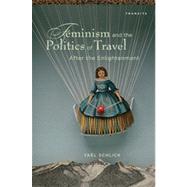Feminism and the Politics of Travel After the Enlightenment
, by Schlick, YaŽl- ISBN: 9781611484281 | 1611484286
- Cover: Hardcover
- Copyright: 1/12/2012
Taking the Enlightenment and the feminist tradition to which it gave rise as its historical and philosophical coordinates, this book explores the coincidence of feminist vindication and travel in the late eighteenth and nineteenth centuries; the way travel's utopian dimension and feminism's utopian ideals have intermittently fed off each other in instructive and productive ways. Such a tack provides a means of highlighting travel's utopian dimension, of complicating the reductive aspects of colonist critiques of travel, and of exploring the way in which travel has functioned, as Georges Van Den Abbeele has put it, as a technology of gender.Feminism and the Politics of Travel After the Enlightenment thus examines how travel is utilized by women writers as a means of arguing for their inclusion in the public sphere, their access to education, and their political participation. Beginning with Rousseau's Emile and its influential discussion of the political and educational value of travel, the gendering of travel and its political implications are analyzed in the works of Mary Wollstonecraft, Stťphanie-Fťlicitť de Genlis, Germaine de StaŽl, Frances Burney, Flora Tristan, Suzanne Voilquin, Gustave Flaubert and George Sand.The fictional and non-fictional works of these authors are viewed in the context of archival and critical material so as to discuss Enlightenment notions of cosmopolitanism and progress (Wollstonecraft), the ideology of domesticity (Genlis, StaŽl, Burney), socialist-utopian-feminist movements of the nineteenth century (Tristan, Voilquin), and the rise of the discipline of geography and of the debate over universal education for girls (Sand). These specific contexts reveal the way in which the activity of travel is instrumental in furthering diverse feminist agendas. The book's epilogue suggests that this utopian strain of the voyage and its link to feminism continues to this day in the works of contemporary travel writers like Robyn Davidson and Sara Wheeler.







